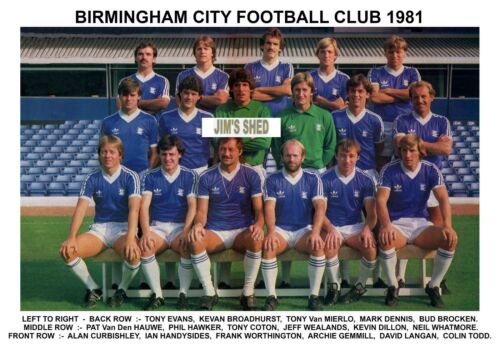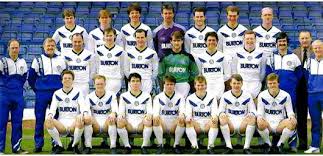24. Jul, 2022
LEEDS UNITED: LEGENDS FAIL TO EMMULATE THE DON
Leeds United, dirty Leeds. The team that everyone loves to hate. The original Marmite club of English football. One thing is for sure most fans have an opinion about the team from Elland Road.
Before the arrival of Donald Revie, Leeds were the club from a Rugby League City. Aside from the considerable talents of John Charles, United were given scant regard in their own County. Both Sheffield clubs spearheaded Yorkshire's challenge for honours. Both had won the League Title and the FA Cup on numerous occasions, albeit in the distant past. But both were still regularly plying their trade in the top flight. Barnsley won the FA Cup in 1912. But the days of wine and white roses belonged to Huddersfield Town. Managed by the visionary Herbert Chapman, the Terriers were Champions of England 3 times in the roaring 1920s. Amazingly the titles were won in successive seasons.
Leeds United's trophy cabinet remained bare. Don Revie was appointed Leeds United manager in 1961. He was a fine player, capped 6 times by England and had won the FA Cup with Manchester City. Leeds were promoted to the First Division in 1963. They won the League Cup in 1968, their first major trophy. Over the next decade they would play some of the finest football ever seen on these shores. Just witness the 7-0 drubbing of Southampton at Elland Road in March 1972. Hapless Saints are reduced to mannequins as Billy Bremner, Johnny Giles and company decide that the ball is the sole property of the home side . Back heals and sublime cross field passes, the Harlem Globetrotters of football now reside in West Yorkshire. But then a League Title, a European Fairs Cup and a League Cup were on display in the Elland Road boardroom. A maiden FA Cup victory would follow that season. Allan Clarke's diving header sealing a 1-0 triumph over Arsenal.
Home grown products Bremner, Norman Hunter and Eddie Gray blending with big money signings Giles, Allan Clarke and Mick Jones. But in truth all were household names ,lets go the whole hog.
HARVEY/SPRAKE
COOPER
REANNIE
MADELEY
HUNTER
CHARLTON
GILES
BREMNER
LORIMER
CLARKE
JONES
GRAY
Indeed I would argue no post war English football team has had such an effect on the General public. The beauty of their play was blighted by a cynical side. Jack Charlton's infamous black book containing an hit list for retribution. Norman 'Bites yer legs' Hunter adding extra muscle. While Bremner and Giles employed more subtle dark arts. Elland Road haters took considerable comfort in Leeds many tales of heartache. Jeff Astle's offside goal ending title hopes in 1971, Fourth Division Colchester knocking them out of the FA Cup. Jim Montgomery's heroics and Ian Porterfield's goal defying Revie's charges in the 1973 FA Cup Final. Most sickeningly Peter Lorimer's disallowed goal in the 1975 European Cup Final. Hot Shot's effort appeared fine, but was chalked off as Bayern Munich prevailed. The offside goal still bristles with the Elland Road faithfull.
Arms raised before kick off to acknowledge the crowd, names on tracksuits, Leeds United, Marc Bolan, Noddy Holder and power cuts were staples of early Seventies Britain. As the 80s began Leeds were as obsolete as platform shoes After winning a second League Championship in 1974, Revie departed for an ill fated stint as England manager. Brian Clough took over. Old Big head lasted 44 days, contrary to public opinion he didn't lose the dressing room, the whole of Elland Road would be a more accurate description. After instructing Don's boys to "Throw all their medal and caps, all their pots and pans into the biggest blooming dustbin." and adding "because you haven't won them fairy." There was no going back. The two Jimmy's (Armfield and Adamson) restored respectability. Jock Stein also lasted 44 days before taking the Scotland job.
But in the Autumn of 1980 the Whites were in dire straits. Adamson resigned after a 4-1 hammering by old foe Sunderland. The Roker Park faithful must have enjoyed the irony, two years earlier Adamson had left Sunderland to join Leeds. The Elland Road board turned to one one of their own. Allan Clarke was appointed manager shortly afterwards. The striker had scored 110 goals in the golden era, earning him the nickname of sniffer. During the early 70s Allan Clarke was one of the best strikers in Europe, he was capped 19 times by England, scoring 10 goals for the Three Lions.
The choice appeared sound, Clarke had a fine managerial CV. In 1979 he oversaw Barnsley's promotion to Division Three. The early signs were promising Leeds recovered to finish a highly creditable 9th in 1981. Clarke had some fine players at his disposal. Scottish Internationals Arthur Graham and Derek Parlane were a handful for any defence while Welsh International Brian Flynn added steel to the midfield. Ok they were not quite Revie vintage, but Leeds United were still a handy proposition. All that changed when Flynn endured a miserable return to his homeland. First Division newcomers Swansea City hammered United 5-1 on the opening day of the 1981-82 season. The traveling hordes from West Yorkshire were crestfallen as their favourites were trounced by a Swansea side wearing all white. Leeds away kit of all yellow seemed in keeping with a pathetic Vetch Field performance. The writing was on the wall, United were relegated in May 1982 and Clarke was sacked the following month.
Another legend was handed the task of plotting a return to the big time. Leeds United have had many great players, but I would dare to suggest that Eddie Gray was the most naturally gifted player ever to pull on the famous white shirt. As anyone who witnessed his wonder goal against Burnley in April 1970 would testify. The whole Clarets defence is beaten before the Scottish winger hammers the ball into the roof of the net. Chelsea manager Dave Sexton changed his tactics to stifle Gray before the 1970 FA Cup Final replay. Gray had run poor David Webb ragged the previous Saturday. Webb was moved to central defence and Ron Harris was asked to shackle Leeds United's left winger. Chopper dished out a brutal tackle and United's most potent attacking weapon was blunted. Meanwhile Webb headed in an extra time winner for the Blues . In a team of brilliant footballers, Edwin Gray was the leading man.
Could the magic be transferred to the dugout? Two top half finishes suggested the corner had been turned. A fine crop of young players were emerging. The midfield pairing of John Sheriden and Scott Sellers were earning rave reviews . Young full back back Denis Irwin had also broken into the first team. But the Irishman was deemed surplus to requirements and was sold to Oldham Athletic. Irwin helped Joe Royle's Latics to promotion to the First Division before enjoying a glittering career with Manchester United and the Republic Of Ireland. The bitterest of all pills for the passionate followers of Leeds United. Leeds finished 5th in 1985 and Gray had run out of time.
What do they say about learning from mistakes, well the Elland Road board were not listening, Having seen two of Don's boys fail in the hot seat, they decided to appoint a third Icon. If Allan Clarke provided goals, while Eddie Gray offered craft. Billy Bremner was the heart and soul of Don Revie's Leeds. The original captain marvel. A red haired Scottish firebrand whose sheer will and skill inspired the gladiators wearing white. A statue of Bremner is located outside Elland Road .Sadly the great man died in 1997, aged just 54.
Leeds United's greatest ever player was appointed manager in 1985. In a fans poll Bremner beat John Charles (2nd) and Eddie Gray (3rd) to the accolade. The new boss was soon active in the transfer market. Striker Keith Edwards was signed from Sheffield United while midfielder Mickey Adams arrived from Coventry City. Indeed it was Coventry who Leeds faced in the memorable 1987 FA Cup Semi Final. United had already disposed of First Division Queens Park Rangers on the way to the Hillsborough showdown. Another upset looked on the cards when David Rennie's flying header gave Leeds a half time lead. Billy Bremner's boys had the Sky Blues on the wrack. Only two fine saves from Coventry goalkeeper Steve Ogrizovic prevented the underdogs from increasing their lead. Eventually Coventry regained their composure and drew level through Mickey Gynn's close range effort. It looked a done deal when Keith Houchen's 80th minute strike put the Midlanders 2-1 up. But Leeds wouldn't lie down and equalsed on 86 minutes, Edwards header delighting the travelling Whites fans. A fantastic football match was finally decided in extra time Coventry winger Dave Bennett tapping home to break Leeds hearts.
Further misery followed in the league that season (team picture shown above). United's 4th place finish earning them a berth in the end of the season play offs and a chance to bring First Division football back to Elland Road. It was the first season of the play offs and the format differed from today. Charlton Athletic who had finished 4th from bottom in the First Division. A position which required unwelcome participation in the end of season lottery. Having seen off Oldham, United faced Charlton in a two legged final.
,
Both legs were won 1-0 by the home side, so the final would be decided by a shoot out at St Andrews. John Sheriden's inch perfect free kick gave the Whites an extra time lead. But with the promised land in sight Leeds crumbled again. Charlton captain Peter Shirtcliff scored twice to preserve the Londoners top flight status and condemn Bremner's side to another season in the wilderness. Ironically Shirtcliff is a Yorkshireman who had once played for Sheffield Wednesday.
The defeat marked the beginning of the end for Billy Bremner. The following season saw Leeds finish a disappointing 7th. After a poor start to the 1988-89 the Scot was sacked and replaced by Sheffield Wednesday manager Howard Wilkinson. Although a proud Yorkshiremen Wilkinson had no links to the Revie era. After a modest playing career with the two Sheffield clubs and Brighton Wilkinson moved into management. He kept Notts County in the First Division before moving to Hillsborough in June 1983. In his first season Wednesday were promoted to the top flight. Wilkinson would later guide the Owls to a 5th place finish, little wonder new chairman Leslie Silver was keen to get Wilkinson to Elland Road.
Having swopped South Yorkshire for West Yorkshire the new boss requested that all the photos of the golden ere be removed. the gesture appeared reminiscent of Clough's bold but doomed approach 14 years earlier. But the new Leeds United manager added this proviso "The pictures will return when Leeds have a team to be proud of."
In 2 years the old photos were beck adorning the Elland Road walls
Wilkinson had done a magnificent job, transforming United from Second Division promotion hopefuls to Champions of England. Leeds pipped bitter rivals Manchester United to the title, the sweetest of triumphs.
It would be easy to blame the Elland Road hierarchy for a decade of decline. Their stubbiness in appointing three 70s greats been the glaring error. But in fairness Revie had recommended that Johnny Giles succeed him in 1974. Instead Chairman Manny Cousins plumped for Clough. Once bitten, Twice shy. You could see why the board turned to three Men steeped in Leeds United folklore. The unlucky trio were also hamstrung by financial problem The club didn't own their own ground and transfer funds were sparse In contrast a healthy transfer kitty funded Wilkinson purchases of Vinnie Jones, Lee Chapman and Gary McAllister.,

